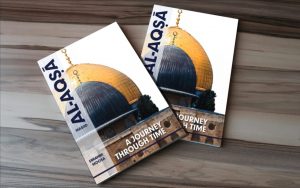 By Naadiya Adams
By Naadiya Adams
Al-Aqsa Mosque has been the centre of the public eye for many weeks in countries around the world – since Israel’s deadly attack on Al-Aqsa and its worshippers that eventually saw over 250 Palestinian people killed on the Gaza Strip, many of them mere children. While a ceasefire remains intact, Israel’s atrocities have not gone unnoticed, in fact, it has evoked emotion in the global community, who stand firm with Palestine and refuse to stay silent. It’s a 21st century global uprising.
With a heightened sense of awareness for Islam’s third holiest site, an opportunity to educate emerged through a personal journey of the mosque’s history neatly placed into over 200 pages.
A debut piece from journalist and researcher, Hafiz Ebrahim Moosa, Masjid Al-Aqsa: A Journey Through Time is Moosa’s “labour of love” and gives readers “a holistic picture of the rich history of Al-Aqsa across periods of decline and revival.”
“Al-Aqsā captivates everyone who is in contact with it, and I pray that this same sense of love is experienced by the readers,” says Moosa.
Published by the Palestine Information Network, the book’s approach is an educational one that offers a bold opportunity to rediscover a site that dates back to the advent of human existence. The ensemble tells the story of Al-Aqsa from an Islamocentric paradigm and officially launched on June 15th.
The key objective of the book is to challenge misconceptions that the only link Islamic tradition holds to Masjidal-Aqsā is from Prophet Muhammad’s (SAW) miraculous journey of Isrā and Mi’rāj , when it is in fact deeply rooted in history.
“We hope that this comprehensive work will fulfil an important role in education on Masjidal-Aqsā and the wider Palestine issue through its fresh approach,” said PIN’s Mawlānā Aboo Baker Mahomed . “The detail it contains is an essential part of a knowledge-based foundation to maintain the momentum for solidarity with the people of occupied Palestine.”
The publishers believe there is a need to tell the story from a Muslim- centric view as the site, and the city itself are sites of sanctity for all of the Abrahamic faiths.
Key features:
- Telling the story of Masjidal-Aqsa from an Islamocentric paradigm.
- Easy to follow chronological approach through various Historical eras and the relation of the Masjid to each.
- Expanding the appreciation of the Masjid from just one or two commonly related events to a broad vista that extends from the beginning to the end of time.
- How the Muslim connection to Al-Aqsa is an intrinsic rather than occasion alone.
- Full colour, complemented with ample pictures and a bold, compact and appealing design.
- ‘Sidenote’ fact boxes that provide fascinating anecdotes to complement the core text.
- A labour of love, and a call from the heart to fulfil our responsibilities towards Masjidal-Aqsa.







0 Comments